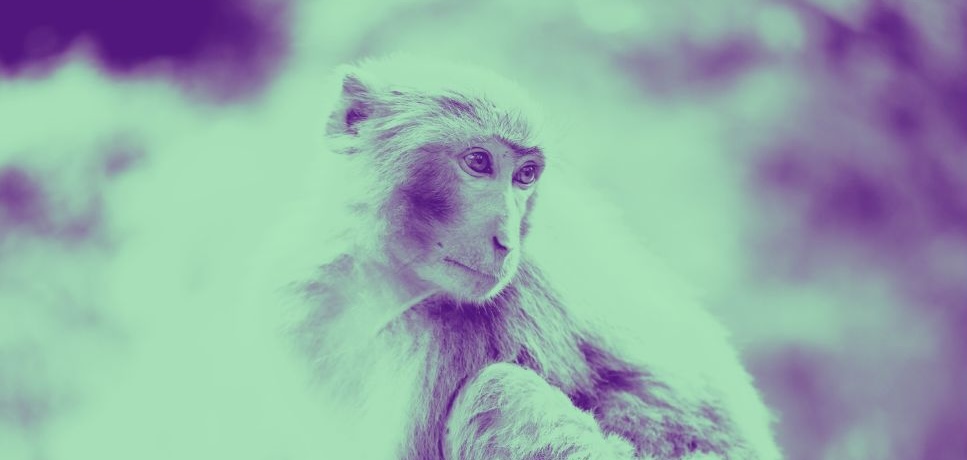“The Girl Who Became a Rabbit”
2
In our backyard, there is a remembered and reliable fig tree. We watch as the macaques climb the branches like children pulling up their mother’s arms. The fig tree’s head is dark green and slant leafed. The macaques’ fur glows brown in the ease of the sun. The macaques tangle up the tree to shake down figs for the younger macaque climbers still navigating the ground. A fig can be eaten in only one handful. Macaques are particular about the ripeness of their fruit, though maybe not as particular as orangutans would be. See the plumped pink macaque cheeks, the pink palmed macaque feet, with nails, scratched fig tree tree bark, the fig tree reliable and marked and so staying remembered.
Our father tells a story at dinner about how he still feels guilty for a time in middle school when he accepted a ride home from the town milkman on the town milkman’s electric scooter. It goes like this: he gets dropped off at his house front door and he bounds inside, and his mother suspiciously says to him now you’re home quick and he says back quite sincerely sure am got a ride! Now his mother’s irritated and now his mother’s a bit livid and now his mother’s explaining that motorcycles are dangerous and rides from strangers are dangerous and what the hell was he thinking. He as an adult expresses shame for as a pre-teen talking back to his mother: the ride was just there it was only just there and I didn’t mean anything by it. Our father could make his mother so mad so mad sometimes he’d deserve a quick slap.
If I leave the apartment for the day, the furniture still sits there. The frames still hold the walls. I’ve spent a lifetime crafting a conception of home and here I’ve come to rest. Green papered flowers. Blue suede chair. Tell me the story. Now tell me again. If the house were more ordered I would have less disordered thinking. This posturing the schism. This positioning containers.
Here is the logic I have maintained in observing my home. I spend a day of routines in roundness, comfort the tea kettle’s impatient whistling. It is important to talk to objects as if they’re your own. For dinner I eat a bowl of rice with raisins, but later decide that this was too much. I remove a tick of mascara suckling the corner of my eye, but later decide that this was too much. In only three hours, the bread makers will be at their routines. And from this angle, part of the angle being the sun, the town really looks quite quaint.
At the ballet, the dancers nod approvingly during one another’s solos. The dancers gesture with performative arm sweeps to exclaim during others’ solos. Oh simply marvelous. Viewer observe. It feels like circus masters displaying the lions: voila grand paws, voila his mane.
It is difficult to identify a lack, hands fallen in folds of ocean, lips water between hips, this ache opening windows, my unwashed hair, the chewed ends of thumbs. But it is a skill to grow gaps, lacustrine, my voice discovered through thinking in atmospheres not scenes, through the history of a feeling.
Like a child’s dull color, like a mother’s shoulder blade, you believe you are building an order you resemble. You believe you are building an order you resemble to have a pair to resemble. You feel folded all over and cut by scratched lines. You are building small houses out of too-folded paper, whole villages of paper bent hard to keep standing.
Inlay the spine, gather the fingers, find thread for the ear. Build a body back to clarify: love is as much a choice as an impulse, a metal chain down a pink torn throat, a lure unhooked, the days you awake and it is not yet tomorrow. The house a feeling of a shrinking enclosure. The sink spilling. The dishes climbing. I pick my face to spit my skin I know there is fear I know my body, a pocket unlined, a fold now because I could not fold then.
It is important to be able to make something beautiful, to shape it into a form even when horrifically right. There is malevolence in misarranging information, in intentionally throwing thoughts into wells without listening for echo. We are built together so we break together but we must build back together, too. If the light flickers, I flicker, too.
And it was beautiful. The night began and years passed within the forest. Coughs of trees and the blue snow light tapped the window. Your shape for the window. The boys voyaged down streets. When he arrived, I let him in. I let him slip me with his hands, knot my hair into cheveux, redraw my half-opened face, move cycles of winter through me like a train. The human formed, so belittled it remained human, so keen in its tidy arrangement. He gathered my skins into a skein, filled my mouth with swallows, let me feel like I was falling into a long blue, flying unseen.
______________________________

From The Girl Who Became a Rabbit. Parts of this poem have previously appeared in The Offing and in The Spectacle’s Revue.
Emilie Menzel
Emilie Menzel’s poetry hybridities have garnered such honors as the New Southern Voices Poetry Prize (selected by Molly McCully Brown), the Deborah Slosberg Memorial Award in Poetry (selected by Diana Khoi Nguyen), and the Cara Parravani Memorial Award in Fiction (selected by Leigh Newman), and feature in such journals as the Bennington Review, Copper Nickel, and The Offing, among others. She holds an MFA from the University of Massachusetts Amherst and serves as an editor and librarian for The Seventh Wave community. She is the author of The Girl Who Became a Rabbit.













